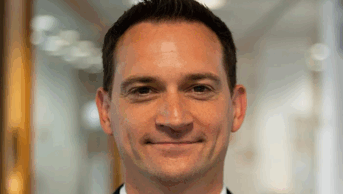If there is one thing that unites pharmacists and pharmaceutical scientists across the globe, it is the desire to deliver better health for this generation and the next. And central to this is the pressing issue of access.
Poor access can be as stark as people in rural South Africa walking miles and waiting all night for the Phelophepa (“good, clean health”) Train to pull in, bringing access to healthcare professionals before disappearing for two years. But equally, it can apply to a patient with multiple sclerosis in a developed country, such as the UK, being denied a medicine. So access is something important to us all, as part of a healthcare profession and as potential receivers of healthcare.
Improving access to cost-effective, quality medicines and services world-wide, is also a fundamental part of FIP’s mission, and for these reasons, I am proud to announce that the theme of FIP’s annual congress this year, to be held in Bangkok, Thailand, is “Access to medicines and pharmacists today, better outcomes tomorrow”.
A key point is that access to medicines without access to pharmaceutical expertise to ensure responsible use, will only partly improve health outcomes. Through the theme of the congress, therefore, we stress the imperative need to link the two.
Access is not just about money
The congress is organised into six streams, the first being access to medicines. Although we need to understand pricing, all too often access is only linked to economics. FIP believes that pharmacists also need to look at access from a product perspective. For example, we have been working on the issue of medicines shortages, which culminated in a global multi-stakeholder summit in Toronto, Canada, last year. Causes and contributing factors and recommendations for how to reduce shortages and their impacts will be shared at a session at the congress.
Access to medicines is also about discovery, innovation and regulation, and these areas will all be tackled, emphasising that the interconnection between pharmacy practice and sciences is crucial to better access. Drug design and formulation are also relevant. Several international initiatives in terms of research and development, for instance, have a prime interest in improving accessibility of existing products.
It is essential that we pharmacists develop the advanced skills we need to improve adherence, to manage and disseminate information, and to build our image, and these vital skills will be detailed at the congress.
It’s all about pharmacy
Pharmacists are often described as underused healthcare professionals. But in some parts of the world there are not enough pharmacists or pharmacies. And even in developed countries such as the UK, where some may consider there are too many pharmacists, their distribution does not always make them available to patients.
To this end, a second congress stream, dedicated to pharmacy services, offers sessions that will help you to increase access to pharmacists. Participants will hear from Walgreen’s executive director of pharmacy services about ways to model pharmacies and they will learn, also, about technology-based solutions, for when pharmacies are shut, from specialists in pharmacy automation.
Participants will also be able to take home ideas from our forum for innovators as well as tips for demonstrating pharmacy’s value since access should be added to the discussion around the compensation of pharmaceutical services.
Some countries, such as Scotland, have already recognised, including from a financial perspective, that pharmacies are a major gateway to the healthcare system and in pharmaceutical triage. A survey carried out by FIP and Pfizer indicated that 13 per cent of people visiting a pharmacy will not buy anything, but will go there for advice. This clearly demonstrates the key role of the pharmaceutical sector in access.
A prime example of the recognition of the continuum of care and the gateway to health that pharmacy provides is in the development of guidelines that highlight the role of pharmacists.In 2012, the World Gastroenterology Organisation invited FIP to contribute to guidelines for the management of “common gastrointestinal symptoms in the community”. The result, published in 2013, supports pharmacists to take a more active role in handling these symptoms through assessment, triage and treatment or referral when appropriate, and will be presented through case studies at the congress.
Hospital pharmacists should also not miss the opportunity to contribute to the revision of the Basel Hospital Pharmacy Statements during the congress.
Transform education
FIP is a non-governmental organisation in official relations with the World Health Organization and the recently published WHO guidelines for “transforming and scaling up health professionals’ education and training”, and its implications for pharmacy, is a hot topic for educators in addition to the tools developed by the FIP Education Initiative (a programme that aims to reform pharmacy education systems).
Suffice to say that access to pharmaceutical expertise also refers to the workforce, which should be competent as well as sufficient in number. The congress is the place to discuss the important changes needed to pharmacy education, including plans to create centres of excellence to stimulate further research, evidence generation and delivery education programmes.
Commitment to change and innovation is critical if pharmacists are to be equipped, also, to expand their scope of practice and advance direct patient services to meet society’s needs. The congress will also see the launch of version 2 of FIP’s quality assurance framework for pharmacy education, a tool to facilitate competency-based training.
Be inspired
This year’s World Pharmacy Congress has something for everyone under the truly unifying issue of access. The packed programme also offers sessions on natural materials, humanitarian work, the environment, history and Thai Pharmacy.
 I hope this article reminds Pharmaceutical Journal readers of the wide variety of factors involved in improving access. Whether you practise in industry, hospital or community pharmacy, there is plenty that can be done to make good health more accessible. On behalf of FIP and our co-hosts, the Pharmaceutical Association of Thailand under Royal Patronage, I encourage you to join me and fellow pharmacists in Bangkok. Come to share experiences during the sessions and at the many social events, hear from international experts and take a critical step towards better access and better outcomes tomorrow, for patients and our profession.
I hope this article reminds Pharmaceutical Journal readers of the wide variety of factors involved in improving access. Whether you practise in industry, hospital or community pharmacy, there is plenty that can be done to make good health more accessible. On behalf of FIP and our co-hosts, the Pharmaceutical Association of Thailand under Royal Patronage, I encourage you to join me and fellow pharmacists in Bangkok. Come to share experiences during the sessions and at the many social events, hear from international experts and take a critical step towards better access and better outcomes tomorrow, for patients and our profession.


